英语中级听力课件Lesson10
- 格式:ppt
- 大小:9.02 MB
- 文档页数:16
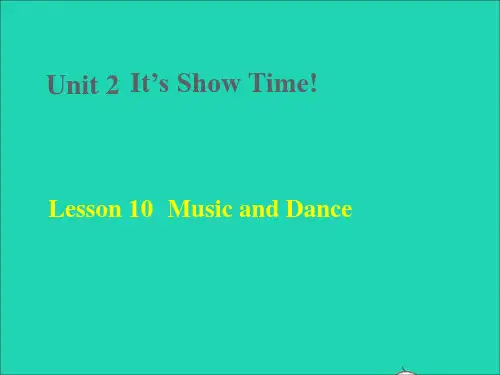
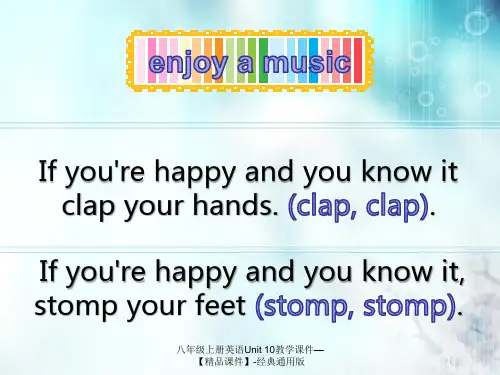
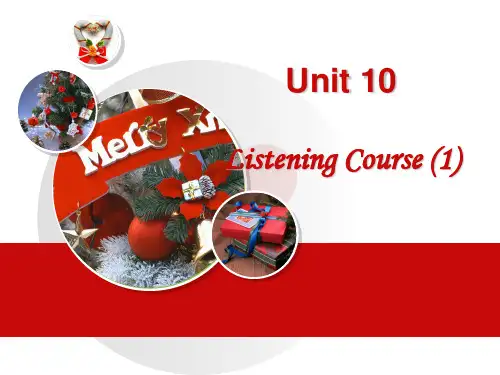
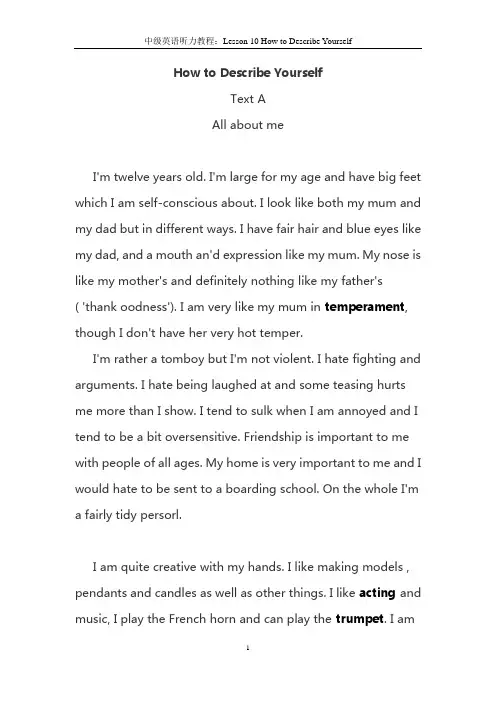
How to Describe YourselfText AAll about meI'm twelve years old. I'm large for my age and have big feet which I am self-conscious about. I look like both my mum and my dad but in different ways. I have fair hair and blue eyes like my dad, and a mouth an'd expression like my mum. My nose is like my mother's and definitely nothing like my father's( 'thank oodness'). I am very like my mum in temperament, though I don't have her very hot temper.I'm rather a tomboy but I'm not violent. I hate fighting and arguments. I hate being laughed at and some teasing hurts me more than I show. I tend to sulk when I am annoyed and I tend to be a bit oversensitive. Friendship is important to me with people of all ages. My home is very important to me and I would hate to be sent to a boarding school. On the whole I'm a fairly tidy persorl.I am quite creative with my hands. I like making models , pendants and candles as well as other things. I like acting and music, I play the French horn and can play the trumpet. I amnot a very keen reader because I like to be outside most of the time. I ride my bike a lot and have been youth hosteling with it. My father lives abroad and I enjoy travelling to see him. I enjoy my food (especially my French grandmother as she is an excellent cook! ) and I have a sweet tooth but I hate the dentist.I don't like my hair being brushed by someone else and I hate it long.Finally, the one thing I really find boring is homework as I would far rather be outside or make something.Text BMy thoughtsI sometimes wonder what my mind is like inside, often I fancy that it is like this. I feel as if my mind goes round and round like the earth and if my lessons make me think hard it begins to spin. In my other class it was getting all stodgy and still and lumpy and rusty. I feel as if there is a ball in my mind and it is divided into pieces -each piece stands for a different mood.The ball turns every now and then and that's what makes me change moods. I have my learning mood, my goodlooks mood, my happy mood, my loose-end mood and my grumpymood, my miserable mood, my thoughtful mood and my planning mood. At the moment I am writing this I am in my thoughtful mood.When I am in my thoughtful mood I think out my maths and plan stories and poems. When my kitten is in her thoughtful mood she thinks shall I pounce or not, and shall I go to sleep or not. This sort of thing goes on in my own mind, too. It is very hard for me to put my thoughts into words.Additional Information(1)He's the sort of chap who loves to make entrances and exits. He'll arrive ten minutes before everybody else and he'll leave ten minutes before everybody else. He'll come dashing in with a bunch of flowers, screaming hellos. He likes to be noticed. He loves telling jokes. He's a well-informed chap and keeps up to date with all the current affairs. He likes to talk and give his view on life .He's very successful. When he sets himself a goal, he works hard to attain that and to achieve it. He knows what he wants and he'll set out to get it. As a result, he's successful. When you're talking to Roger, sometimes you're left way, waybehind. His mind is whizzing over so fast that you're talking about something, and he's off at a tangent,talking about something completely different. He can't sit down. He's not. He can't relax. He's always jumping up and doing things and finds it hard to concentrate at times.(2)She gazes at.herself in wonder. Vanished are her healthy pink cheeks, her slightly red winter nose, her mole, herlittle freckles and blemishes; she is smooth, new made.She dabs a little powder on top, and stands back to admire the effect. It is pleasing, she decides. She wonders what it will look like by midnight. Will she be transformed imo an uneven, red-faced, patchy,blotchy clown? An ugly sister?(3)When she was twenty-three years old, she met, at a Christmas party, a young man from the Erewash Valley. Morel was then twenty-seven years old. He was well set-up,erect, and very smart. He had wavy black hair that shone again, and a vigorous black beard that had never been shaved. His cheeks were ruddy, and his red, moist mouth was noticeable because he laughed so often and so heartily.He had that rare thing, a rich, ringing laugh. Gertrude Coppard had watched him, fascinated. He was so full of colourand animation, his voice ran so easily into comic grotesque, he was so ready and so pleasant with everybody. Her own father had a rich fund of humour,but it was satiric. This man's was different: soft, non-intellectual, warm, a kindof gambolling.She herself was opposite. She had a curious, receptive mind which' found much pleasure and amusement in listening to other folk. She was clever in leading folk to talk. She loved ideas, and was considered very intellectual. What she liked most of all was an argument on religion or philosophy or politics with some educated man. This she did not often enjoy. So she always had people tell her about themselves, finding her pleasure so.In her person she was rather small and delicate, with a large brow, and dropping bunches of brown silk curls. Her blue eyes were very straight, honest,and searching. She had the beautiful hands of the Coppards. Her dress wasalways subdued. She wore dark blue silk, witha peculiar silver chain of silver scallops. This, and a heavy brooch of twisted gold, was her only ornament. She wasstill perfectly intact, deeply religious, and full of beautiful candour.1temperamentn.气质,性格,性情参考例句:The analysis of what kind of temperament you possess is vital.分析一下你有什么样的气质是十分重要的。
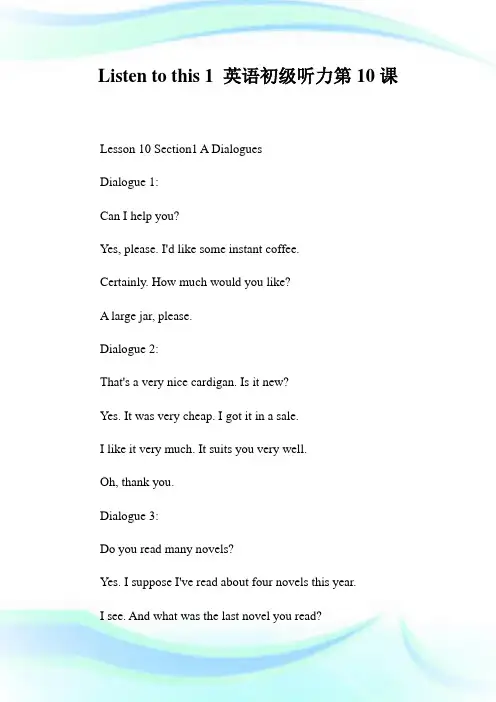
Listen to this 1 英语初级听力第10课Lesson 10 Section1 A DialoguesDialogue 1:Can I help you?Yes, please. I'd like some instant coffee.Certainly. How much would you like?A large jar, please.Dialogue 2:That's a very nice cardigan. Is it new?Yes. It was very cheap. I got it in a sale.I like it very much. It suits you very well.Oh, thank you.Dialogue 3:Do you read many novels?Yes. I suppose I've read about four novels this year.I see. And what was the last novel you read?Let me see. It was A Man in Havana.And when did you read it?I read it on Tuesday evening.Why did you read it?Well ...Dialogue 4:Do you smoke?Yes, I do.How long have you been smoking for?Six years.And how many cigarettes have you smoked during that time?Thousands!Dialogue 5:I was just about to have a swim when I saw the shark!That's nothing. I was in the middle of swimming when I saw the shark.What happened?I started swimming for the shore, of course.B.Hotel EnglishCan I have breakfast in my room?Certainly, madam. Breakfast is served in your room from 7 o'clock until 10. Here is the menu.Thank you. (looks at the menu) I'd like to have the Continental Breakfast.Yes, madam. And at what time would you like it?About half past eight, I think.8:30. Very good, madam. And what kind of fruit juice would you like? We have pineapple, orange, grapefruit...I think I'd like the pineapple please.Pineapple juice. And would you prefer tea or coffee?Coffee please.Thank you very much. Goodnight. (At 8:30 the next morning, there is a light tap at Yvonne's door.)Y-es. Come in.I've brought you your breakfast, madam.Oh yes. Thank you. Could you put it on the desk over there please?Shall I pour you a cup of coffee straight away, madam?No, thanks. I'll pour it myself in a minute.Is there anything else, madam?No-no, I don't think so, thank you.Section 2 A.Discussion.Eddie is talking to Tom.Have you ever been really frightened?I suppose so, once or twice.Can you remember when you were most frightened?That isn't difficult.What happened?Well, we used to have a favorite picnic place beside a lake. We had a boat there. I was there with some friends and I decided to swim to a little island. It didn't look far and I started swimming ... but half wayacross I realised it was a lot further than I thought. I was getting very tired. I shouted. Luckily my friends heard me and brought the boat. I thought I was going to drown. I've never been more frightened in my life.B.Forum.Should school children take part-time jobs?This is a discussion which will appear in a magazine.This month our panel looks at part-time jobs. Are they good for school children or not?Definitely not. The children have got two full-time jobs already: growing up and going to school. Part-time jobs make them so tired they fal1 asleep in class.I agree. I know school hours are short, but there's homework as well. And children need a lot of sleep.Young children perhaps, but some boys stay at school until they're eighteen or nineteen. A part-time job can't harm them. In fact, it's good for them. They earn their pocket-money instead of asking their parents for it. And they see something of the world outside school.You're absolutely right. Boys learn a lot from a part-time job. And we mustn't forget that some families need the extra money. If the pupils didn't take part-time jobs they couldn't stay at school.Well, we seem to be equally divided: two for, and two against. What do our readers think?Section 3 Spot Dictation.Spot Dictation 1:Philip Andrew is 16 and he is about to leave school.He comes to me for advice every week.He is looking for an interesting job and he would like good wages.One of his friends works in a supermarket.Another friend works in a factory.Philip thinks supermarket jobs are not well paid.And factory jobs are boring.Spot Dictation 2:And finally, some news from the United States.David Thomas, the Californian pop singer, is sixteen today and he is giving a party for sixty guests.His young friends have bought him a Rolls-Royce, the most expensive one they could find.David is famous because he is the fastest driver and the youngest pop star in the state of California.He is flying to Paris tomorrow.。
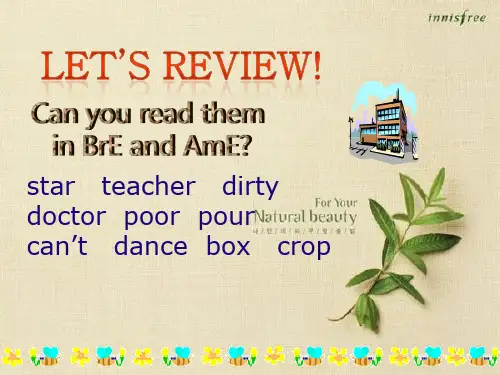
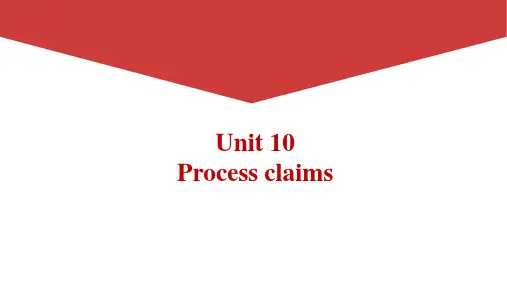

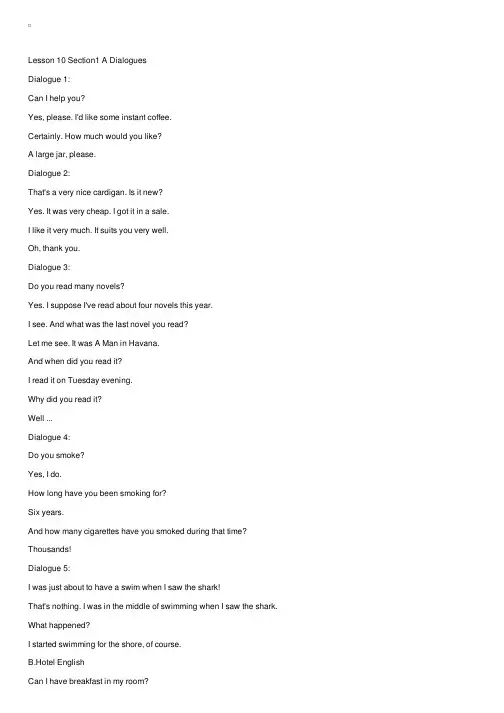
Lesson 10 Section1 A DialoguesDialogue 1:Can I help you?Yes, please. I'd like some instant coffee.Certainly. How much would you like?A large jar, please.Dialogue 2:That's a very nice cardigan. Is it new?Yes. It was very cheap. I got it in a sale.I like it very much. It suits you very well.Oh, thank you.Dialogue 3:Do you read many novels?Yes. I suppose I've read about four novels this year.I see. And what was the last novel you read?Let me see. It was A Man in Havana.And when did you read it?I read it on Tuesday evening.Why did you read it?Well ...Dialogue 4:Do you smoke?Yes, I do.How long have you been smoking for?Six years.And how many cigarettes have you smoked during that time? Thousands!Dialogue 5:I was just about to have a swim when I saw the shark!That's nothing. I was in the middle of swimming when I saw the shark. What happened?I started swimming for the shore, of course.B.Hotel EnglishCan I have breakfast in my room?Certainly, madam. Breakfast is served in your room from 7 o'clock until 10. Here is the menu.Thank you. (looks at the menu) I'd like to have the Continental Breakfast.Yes, madam. And at what time would you like it?About half past eight, I think.8:30. Very good, madam. And what kind of fruit juice would you like? We have pineapple, orange, grapefruit...I think I'd like the pineapple please.Pineapple juice. And would you prefer tea or coffee?Coffee please.Thank you very much. Goodnight. (At 8:30 the next morning, there is a light tap at Yvonne's door.)Y-es. Come in.I've brought you your breakfast, madam.Oh yes. Thank you. Could you put it on the desk over there please?Shall I pour you a cup of coffee straight away, madam?No, thanks. I'll pour it myself in a minute.Is there anything else, madam?No-no, I don't think so, thank you.Section 2 A.Discussion.Eddie is talking to Tom.Have you ever been really frightened?I suppose so, once or twice.Can you remember when you were most frightened?That isn't difficult.What happened?Well, we used to have a favorite picnic place beside a lake. We had a boat there. I was there with some friends and I decided to swim to a little island. It didn't look far and I started swimming ... but half wayacross I realised it was a lot further than I thought. I was getting very tired. I shouted. Luckily my friends heard me and brought the boat. I thought I was going to drown. I've never been more frightened in my life.B.Forum.Should school children take part-time jobs?This is a discussion which will appear in a magazine.This month our panel looks at part-time jobs. Are they good for school children or not?Definitely not. The children have got two full-time jobs already: growing up and going to school. Part-time jobs make them so tired they fal1 asleep in class.I agree. I know school hours are short, but there's homework as well. And children need a lot of sleep.Young children perhaps, but some boys stay at school until they're eighteen or nineteen. A part-time job can't harm them. In fact, it's good for them. They earn their pocket-money instead of asking their parents for it. And they see something of the world outside school.You're absolutely right. Boys learn a lot from a part-time job. And we mustn't forget that some families need the extra money.If the pupils didn't take part-time jobs they couldn't stay at school.Well, we seem to be equally divided: two for, and two against. What do our readers think? Section 3 Spot Dictation.Spot Dictation 1:Philip Andrew is 16 and he is about to leave school.He comes to me for advice every week.He is looking for an interesting job and he would like good wages.One of his friends works in a supermarket.Another friend works in a factory.Philip thinks supermarket jobs are not well paid.And factory jobs are boring.Spot Dictation 2:And finally, some news from the United States.David Thomas, the Californian pop singer, is sixteen today and he is giving a party for sixty guests. His young friends have bought him a Rolls-Royce, the most expensive one they could find.David is famous because he is the fastest driver and the youngest pop star in the state of California. He is flying to Paris tomorrow.。
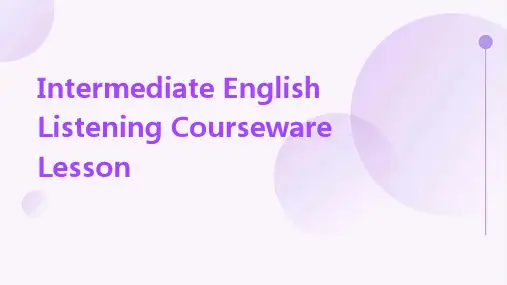
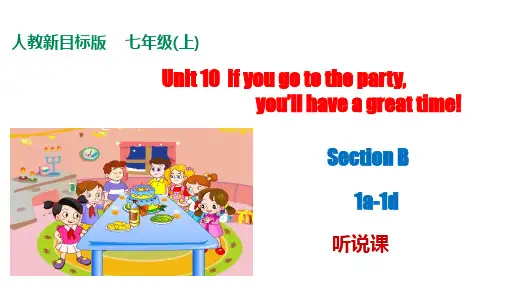
TEACHING DESIGNPeriod 1Step I. Warm-up activities1.Greetings;2. Employ some questions about invitation for discussion.a. Have you ever had a part-time job in a company, factory or shop?b. If so, describe the type of business the organization does, or what products it produces?c. If not, could you say what type of business your parents do or what products they produce ? Step II. Listening activities in section A1.New words and expressions.plant n. 工厂,车间;植物;设备;庄稼vt. 种植;培养;栽培;headquarters n. 总部Their headquarters are in Paris.headquarter vt. 在…设总部They headquartered in New York.2.Play the record for the first time and ask students to finish part B.3. Play the record for the second time and ask students to finish part A.4. Check the answers.Step III. Speaking activities in section A1. Learn the new expressions together and pay special attention to the italicized expressions.2. Give two minutes to students to read and get more familiar with the expressions.3. Check their familiarity with the target expressions.这是家中国公司,属于海尔集团。
Lesson 10Here's the news at 11:30.Thousands of people have marched through the centre of Corby in Northamptonshire to protest against plans to close the steel works, the town's major employer. The marchers demonstrated outside the local British Steel Corporation's headquarters where union leaders are talking about closure plans with the management.Hospital waiting lists in the south west of England have gone up by a quarter in the last five years. While the number of doctors, nurses and other staff have increased, the demand on the service has grown even faster.The EEC is to give another £31 million to Britain's poorer areas. The aid from the regional development fund includes £13.5 million for Northern Ireland and £10 million for industrial improvement and road works in the north of England.In a report on rabies controls, Kent County Council has said that 17 dogs, 5 cats, 2 rabbits and 2 hamsters have been landed illegally at Channel ports in the first nine months of this year. This was seven more than in the same period last year.A derailed coal train at Thirsk in North Yorkshire has disrupted rail services between Newcastle and the south of England.It's time for the news at 3:30 here on Radio I.A girl aged 16 armed with a shotgun held up a class of children at a secondary school in Surrey this morning. Police said that soon after school began at Blair Hill Secondary School, Newton, the girl, armed with a double-barrelled shotgun belonging to her brother, went into one of the classrooms and threatened a teacher and about thirty pupils. A shot was fired into the ceiling as she was being overpowered by police officers.Surgeons at Cambridge have successfully transplanted a pancreas—the organ that produces insulin—in two patients suffering from diabetes. One patient, a 23-year-old electronics worker also had a liver transplant. The other patient, a 55-year-old housewife, had a kidney transplanted at the same time. Both patients are doing well.A stately home owner who allowed a pop concert to be staged in his grounds was fined yesterday for letting a rock band play overtime. The Honourable Frederick Sidgwick Johnson admitted allowing the rock group Led Zepplin to play on after midnight during a concert at his home near Stevenage two months ago. Stevenage magistrates fined him £125 with £25 costs.Three people have so far been killed in the storms sweeping across the north of England and southern Scotland. A woman was killed in Carlisle when a chimney on a house collapsed and two men were killed when their car crashed into a fallen tree on a country road near Melrose. More high winds and rain are forecast for tonight.Professor Richard Hill is talking about British newspapers.It seems to me that many British newspapers aren't really newspapers at all. They contain news, it is true, but much of this news only appears in print because it is guaranteed to shock, surprise or cause a chuckle.What should we expect to find in a real newspaper? Interesting political articles? Accurate reports of what has been happening in distant corners of the world? The latest news from the stock exchange?Full coverage of great sporting events?In-depth interviews with leading personalities?It is a sad fact that in Britain the real newspapers, the ones that report the facts, sell in thousands, while the popular papers that set out to shock or amuse have a circulation of several million. One's inescapable conclusion is that the vast majority of British readers do not really want a proper newspaper at all. They just want a few pages of entertainment.I buy the same newspaper every day. In this paper political matters, both British and foreign, are covered in full. The editorial column may support government policy on one issue and oppose it on another. There is a full page of book reviews and another devoted to the latest happenings in the theatre, the cinema and the world of art. Stock exchange prices are quoted daily. So are the exchange rates of the world's major currencies. The sports correspondents are among the best in the country, while the standard of the readers' letters is absolutely first-class. If an intelligent person were to find a copy of this paper 50 years from now, he or she would still find it entertaining, interesting and instructive.So my favourite newspaper is obviously very different from those popular papers that have a circulation of several million. But that does not mean that it is 'better' or that they are 'worse'. We are not comparing like with like. A publisher printing a newspaper with a circulation of several million is running a highly successful commercial operation. The people who buy his product are obviously satisfied customers and in a free society everybody should have the right to buy whatever kind of newspaper he pleases.Dave: Dr. Jones, how exactly would you define eccentricity?Dr. Jones: Well, we all have our own particular habits which others find irritating or amusing, but an eccentric is someone who behaves in a totally different manner from those in the society in which he lives.Dave: When you talk about eccentricity, are you referring mainly to matters of appearance?Dr. Jones: Not specifically, no. There are many other ways in which eccentricity is displayed. For instance, some individuals like to leave their mark on this earth with bizarre buildings. Others have the craziest desires which influence their whole way of life.Dave: Can you give me an example?Dr. Jones: Certainly. One that immediately springs to mind was a Victorian surgeon by the name of Buckland. Being a great animal lover he used to share his house openly with the strangest creatures, including snakes, bears, rats, monkeys and eagles.Dave: That must've been quite dangerous at times.Dr. Jones: It was, particularly for visitors who weren't used to having 'pets'—for want of a better word—in the house. They used to get bitten and even attacked. And the good doctor was so interested in animals that he couldn't resist the temptation to sample them as food. So guests who came to dinner had to be prepared for a most unusual menu, mice on toast, roast giraffe. Once he even tried to make soup from elephant's trunk. Strangely, though, his visitors seemed to go back for more.Dave: They must've had very strong stomachs, that's all I can say. Dr. Jones, what particular kind of eccentric are you most interested in from a psychologist's point of view?Dr. Jones: I think they're all fascinating, of course, but on the whole I'd say it's the hermit that I find the most intriguing, the type who cuts himself off from the world.Dave: Does one of these stand out in your mind at all?Dr. Jones: Yes, I suppose this century has produced one of the most famous ones: the American billionaire, Howard Hughes.Dave: But he wasn't a recluse all his life, was he?Dr. Jones: That's correct. In fact, he was just the opposite in his younger days. He was a rich young man who loved the Hollywood society of his day. But he began to disappear for long periods when he grew tired of high living. Finally, nobody was allowed to touch his food and he would wrap his hand in a tissue before picking anything up. He didn't even allow a barber to go near him too often and his hair and beard grew down to his waist.Dave: Did he live completely alone?Dr. Jones: No, that was the strangest thing. He always stayed in luxury hotels with a group of servants to take care of him. He used to spend his days locked up in a penthouse suite watchingadventure films over and over again and often eating nothing but ice cream and chocolate bars. Dave: It sounds a very sad story.Dr. Jones: It does. But, as you said earlier, life wouldn't be the same without characters like him, would it?1. In the United States we are using more and more oil every day, and the future supply is very limited.2. It is estimated that at the current rate of use, oil may not be a major source of energy after only 25 more years.3. We have a lot of coal under the ground, but there are many problems with mining it, transporting it, and developing a way to burn it without polluting the air.4. Production of new nuclear power plants has slowed down because of public concern over the safety of nuclear energy.5. The government once thought that we would be getting 20 percent of our electricity from nuclear energy by the 1970's, but nuclear energy still produced only about 12 percent of our power as of 1979.6. There is no need to purchase fuel to operate a solar heating system because sunshine is free to everyone.7. Because solar systems depend on sunshine, they can't always provide 100% of your heat.8. Solar heating can be used in most areas of the United States, but it is most practical in areas where there is a lot of winter sunshine, where heat is necessary, and where fuel is expensive.9. A hot-liquid system operates in basically the same way except the hot-liquid system contains water instead of air; and the storage unit is a large hot water tank instead of a container of hot rocks.10. Then energy from the sun may provide the answer to our need for a new, cheap, clean source of energy.V oice AnalysisIf we want to measure voice features very accurately, we can use a voice analyser. A voice analyser can show four characteristics of a speaker's voice. No two speakers' voices are alike. To get a voice sample, you have to speak into the voice analyser. The voice analyser is connected to a computer. From just a few sentences of normal speech, the computer can show four types of information about your voice. It will show nasalization, loudness, frequency and length of articulation. The first element, nasalization, refers to how much air normally goes through your nose when you talk. The second feature of voice difference is loudness. Loudness is measured in decibels. The number of decibels in speaking is determined by the force of air that comes from the lungs. The third feature of voice variation is frequency. By frequency we mean the highness or lowness of sounds. The frequency of sound waves is measured in cycles per second. Each sound of a language will produce a different frequency. The final point of voice analysis concerns the length of articulation for each sound. This time length is measured in small fractions of a second. From all four of these voice features—length of articulation, frequency, loudness and nasalization—the voice analyser can give an exact picture of a person's voice.。
中级英语口语Lesson10Summary: Vanessa, Alexander and Nick talk about the history of the Oscars. In this broadcast Vanessa, Alexander and Nick are in the middle of a live show in a radio studio.Listen to their conversation and answer the question that follows about the main idea.Dialogue:Vanessa:In tonight’s show Nick will be reporting on the history of the Oscars. Nick do you know when the first Oscars were handed out?Alexander: Oh let me answer this question Nick.Nick: Ok, go ahead Alexander.Alexander: Any movie fan knows the answer to this question …it was sometime in the thirties when talkies I mean talking movies had just begun.Nick: That was really close Alexander but actually, the first Academy Awards were handed out on May 16, 1929.Vanessa: Was there a ceremony back then?Nick: Yes! And it was held at a hotel in Hollywood. And, even though it wasn’t so important back in those days, it was still pretty glamorous.Vanessa: In Hollywood, of course. Where the action is, where else!Alexander: How many people attended the ceremony, Nick?Nick: More than 270 and the tickets for guests cost $5.Vanessa:Wow, that’s a lot of people considering it was the year the Great Depression started.Alexander: Right! The great depression started in 1929; I’d never made the connection before! Anyway … was it as full of suspense as it is now?Nick: No, not really.Vanessa: What do you mean Nick?Nick: Well, the winners were known before the big night. You see the results had been given to the newspapers in advance!Alexander: So the results were not sealed in an envelope..?Nick: No, no. They started that the next year.Vanessa: Was it popular in the beginning?Nick: You bet. In the second year enthusiasm for the Awards was so high that an L.A. radio station covered the ceremony live.Vanessa:Now they’re on TV, with millions of people watching from all over the world. And the paparazzi sharks and tabloid reporters get fodder for their papers the next day.Now answer the following question…What are Vanessa, Alexander and Nick talking about? They’re talking about the history of the Oscar AwardsNow listen again to the dialogue in parts. After each part there will be 3 to 4 questions on the details...Part 1Vanessa:In tonight’s show Nick will be reporting on the history of the Oscars. Nick do you know when the first Oscars were handed out?Alexander: Oh let me answer this question Nick.Nick: Ok, go ahead Alexander.Alexander: Any movie fan knows the answer to this question …it was sometime in the thirties when talkies I mean talking movies had just begun.Nick: That was really close Alexander but actually, the first Academy Awards were handed out on May 16, 1929.Vanessa: Was there a ceremony back then?Nick: Yes! And it was held at a hotel in Hollywood. And, even though it wasn’t so important back in those days, it was still pretty glamorous.Vanessa: In Hollywood, of course. Where the action is, where else!Now answer some questions…1. Nick says:“That was really close Alexander.” What does “close” mean? Close means “almost correct.”2. Nick says “The first Academy Awards were handed out on May 16, 1929.” What does ‘hand out’ mean? ‘Hand out’ in this case means to give an award.3. Vanessa says:“In Hollywood, of course. Where the action is, where else!” What does “where the action is” mean? “Where the action is” is used to describe an important place, where important things take place.” So here Vanessa is trying to explain to her listeners that Hollywood is an important place for actors.Now listen to the second part of the dialogue…Part 2Alexander: How many people attended the ceremony, Nick?Nick: More than 270 and the tickets for guests cost $5.Vanessa:Wow, that’s a lot of people considering it was the year the Great Depression started.Alexander: Right! The great depression started in 1929; I’d never made the connection before! Anyway…was it as full of suspense as it is now?Nick: No, not really.Vanessa: What do you mean Nick?Nick: Well, the winners were known before the big night. You see the results had been given to the newspapers in advance!Alexander: So the results were not sealed in an envelope..?Nick: No, no. They started that the next year.Vanessa: Was it popular in the beginning?Nick: You bet. In the second year enthusiasm for the Awards was so high that an L.A. radio station covered the ceremony live.Vanessa:Now they’re on TV, with millions of people watching from all over the world. And the paparazzi sharks and tabloid reporters get fodder for their papers the next day.Now answer some questions…1. Alexander says:“I’d never made the connection before!” What does “make the connection” mean? “Make the connection” means to think of the similarities; here Alexander is trying to say that he hadn’t real ized that both of these two events started the same year.2. Nick says:“You bet!” What does “you bet” mean? “You bet” is an informal expression and it means “certainly.”3. Vanessa says:“And the paparazzi sharks and tabloid reporters get fodder for their papers the next day.” What does “fodder” mean? “Fodder” here means “material.”GLOSSARY1. Attend (verb, formal): to go to an event, place, etc.e.g. Over two hundred people attended the funeral.2. Ceremony (noun): a formal public event with special traditions, actions, or words. e.g. An awards ceremony3. Glamorous (adjective): attractive in an exciting and special way. e.g. a glamorous woman/outfit4. Hand out (phrasal verb): to give something to each person in a group or place. e.g. The teacher asked her to hand out the worksheets.5. Hold (verb): to make something, especially a meeting, event, party or an election happen. e.g. Could we hold a meeting to discuss this tomorrow afternoon?6.In advance: before a particular time, or before doinga particular thing. e.g. If you're going to come, please let me know in advance.7.Make a connection: link or join two facts, ideas etc.e.g. The police have a made a connection between the missing diamonds and my stolen car.8. Seal (verb): close a container or space by coveringit with something so that air or other substances cannot get in or out. e.g. seal the envelope9. Suspense (noun): the feeling of excitement or anxiety which you have when you are waiting for something to happen and are uncertain about what it is going to be. e.g. She kept him in suspense for several days before she said that she would marry him.10. Tabloid (noun, adjective): a type of popular newspaper with small pages which has many pictures and short simple reports. e.g. The story about her divorce made the front pages in all the tabloids.Practice using the words in the glossary. Choose the most appropriate word from the glossary to complete the following sentences.1. A__- to honor those who gave their lives in the warwill be held next Sunday.2. Being a model is not as__ a job as it may appear.3. Being a__ journalist means invading people’s private lives.4. I had never made the___ between Easter and the phases of the moon until someone pointed it out to me.5. Please__ the documents and mail them to the President.6. The election will be__ on 8th of August.7. Fortunately we had booked the tickets__ or we would never have found a seat.8. The meeting is on the fifth and we're hoping everyone will __.9. The__ is killing me. I can’t wait to find out who won!10. They stood on the street corner__ leaflets.1. ceremony2. glamorous3. tabloid4. connection5. seal6. held7. in advance8. attend9. suspense 10. handing out。